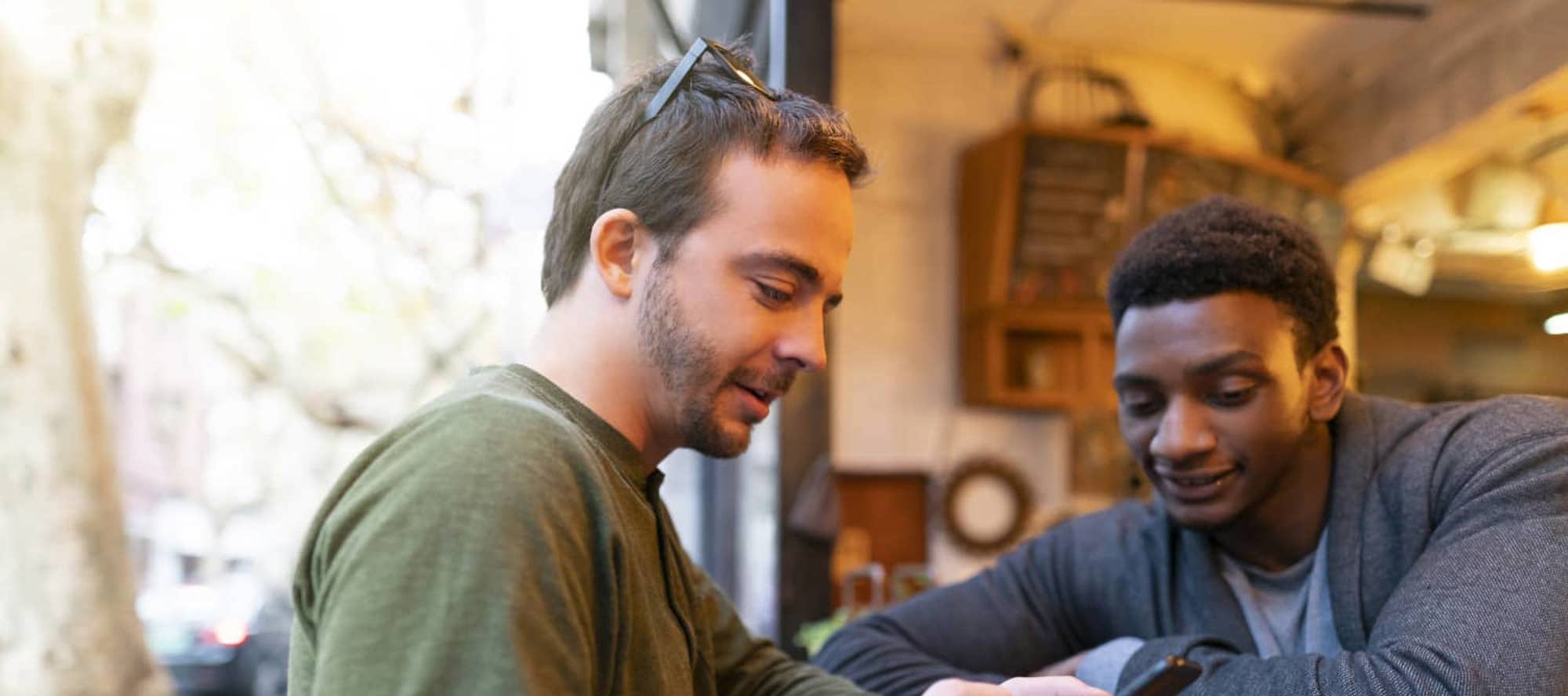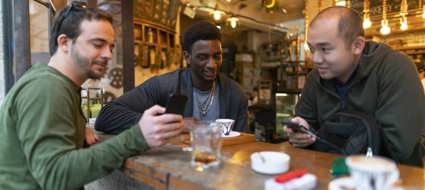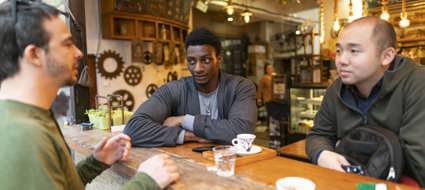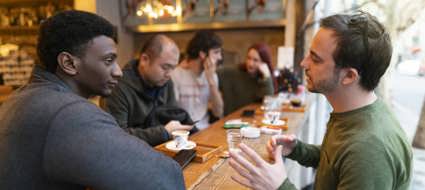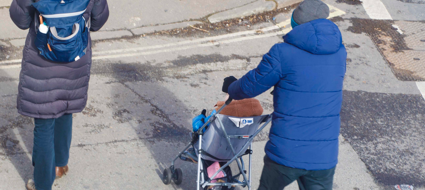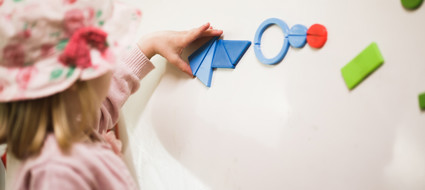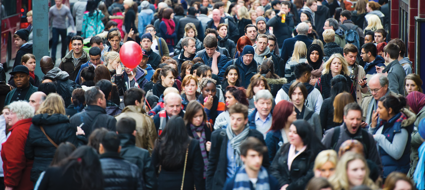Working with men in Leeds: Journey Project
Published:
This podcast explores a service being developed in Leeds City Council to work with fathers from Black, Asian and minoritised ethnic backgrounds, with reflections from a father who took part in this project about his experiences.
This podcast explores a service being developed in Leeds City Council to work with fathers from a Black, Asian and minoritised ethnic background, with reflections from a father who took part in the Journey project.
Laura Bracey from Research in Practice speaks to Aurio about his experience of working with the Journey project in Leeds, a project set up to support fathers from a Black, Asian and minoritised ethnic background. They are joined by Marcus, who leads the Journey project.
In this podcast, Marcus discusses how he set up the Journey project and how he works to support fathers. Marcus and Aurio reflect on their own experience of working together, and on the importance of understanding someone’s cultural identity, listening and sharing emotions.
This podcast is the third in a series of three podcasts about the journey that Leeds City Council is taking to improve its work with fathers.
[Introduction]
This is a Research in Practice podcast, supporting evidence-informed practice with children and families, young people and adults.
Laura: Hello, and welcome to this Research in Practice podcast. I'm Laura and today I'm delighted to be joined by Marcus and Aurio who are going to be talking about the Journey Project, which has been successfully implemented in Leeds City Council. This podcast is the last in the three-part series focused on the topic of working with men. Hi, Marcus and Aurio.
Aurio: Hello Laura.
Marcus: Hello Laura.
[The Journey Project]
Laura: Hello. can I just start us off, and introduce yourselves and tell us a bit about your story in relation to the Journey Project. Aurio, do you want to go first on that one?
Aurio: Yes. So, I met with Marcus a few months ago when I had some fights with my wife. So, I came to England three years ago, so where I am from we have…what can I say…different manners to resolve some problems. But when I fought with my wife the social worker came to my home and she talked to me about this project.
Laura: So, Marcus, can you just talk to us a little bit about why you decided to set up this programme and, you know, how you went about doing it?
Marcus: Yes, absolutely. So, I was employed by Caring Dads to work with BAME [Black, Asian and Minoritised Ethnicity], BAME fathers, as we felt that there was a gap there, there was the lack of support to work with BAME families and especially BAME men.
So, I think initially when I was given the post I didn't really know where to start, it was quite daunting at first because I think there's a misconception that BAME communities will shut their door on you straight away if you talk about domestic violence, and I think speak to other people that would say, 'Good luck trying to engage with communities around these subjects.’ So initially I was, kind of, having to scratch my head to think, 'Where do I start, really, with putting something together?'
So, I went out and spent, you know, the first few months in my post just going to different community centres and different organisations, finding out what's already out there, finding out men's experiences, so I spoke to a lot of BAME fathers that had completed the Caring Dads programme to find out what was missing from the programme, how did they feel about being, I mean, the vast majority of the time, being the only BAME person in a group as well and not being able to, maybe, feel comfortable sharing their experiences. So that gave me, you know, time to speak to men, understand their journey, their story. And going and speaking to other communities and introducing myself and telling them, you know, what my post is, what I'm here to do and even though I was expecting the shut doors that people said, actually, people were pretty open and intrigued. And maybe it's because I've grown up in this city and I'm from different backgrounds myself, so maybe that helped, but I actually found people were quite open and welcoming and wanted to have these conversations. You know, I didn't come in instantly and say, 'I'm here to talk about domestic violence' but, 'I'm here to talk about relationships and what we do well in relationships and what we can improve on, and I want to hear your story, your journey.'
So that really gave me a lot to think about and I think that was when I'd gone away and thought about different ideas of what we could do. You know, my first idea was, 'Do we run a BAME group?' And, again, I spoke to other communities, tried to get feedback of what they would like. I think what a lot of people, what I'd learned myself is that that BAME umbrella has so many different cultures within cultures and that one size still wouldn't fit all within each community. And also there's things like language barriers as well, we can't run a group with three or four different languages at the same time. I'd looked at running a Black fathers' group as well and spoke to people within the community about how they'd feel about having a Black fathers' group. And, again, some people were quite reluctant to do that because if you're a part of a community, and this is the same for lots of communities, if you're a small community the chances are you all know each other to some extent and, actually, they felt less comfortable being in a room full of people from the same community. So that really helped me understand that, actually, this isn't going to be as effective as a group.
So then, you know, I had discussions with my manager about looking at doing one to one sessions, and I piloted one to one sessions at first and that was quite tricky at first, I think I wasn't really getting the referrals. And I'm not sure why that was initially, I think maybe people weren't that comfortable having conversations with BAME fathers about coming onto a project. At the time it didn't have a name, it was just BAME, you know, ‘Working with BAME men’. Once I'd opened that up to the rest of the council I got a lot more referrals, and then I was able to test some ideas with each man, different that I've got and again learning from them each time. After I'd had a few pilot sessions I then thought, 'This needs to be something now, it's worked relatively well, I've got good feedback from the men.' So, yes, I spent time thinking about what a package could be, what individual sessions could be and that's how the Journey Project came together really, I felt that I'd listened to the men's journeys, and it just made sense to call it the Journey Project, really, and go on that journey with the men.
Laura: That's great. And can you tell us a little bit about what that package then looked like, after going through that process?
Marcus: The Journey Project was really based on understanding the man's journey, the man's story. And sometimes we bypass that, and we focus on the incident or the reason that they're on the programme, whereas with the Journey Project, and within those first two sessions, what we do in those first two sessions is talk about your journey. So I spent time in that session finding out about Aurio's life in Angola and understanding his perception of what a healthy relationship looks like, having an understanding of how do we deal with family conflict culturally? Because we have an idea of how we do it in this country but it's important to understand how other people do it as well. And I think my, kind of, core belief, really, with the Journey Project was, you know, that our culture, and our identity and our experiences shape how we parent and how we understand relationships. So, what really worked with this Journey Project was that time, that time that I allowed these men to be able to talk about their journey, for me to understand where their core values and beliefs come from, and hopefully creating a safe space to be able to do that and, as professionals, park some of our own stereotypes of cultures and relationships and allow that space for Aurio to be able to just share.
So, once we've done that, and we've done that first two or first session of the journey, sorry, I then would be asking the dad, 'What things do you feel that you need to work on?' You know, I'll remind the dads, 'we're here to look at the things you do well but we're also here to look at the things we can improve on, so we're getting the men to almost set some goals, some things that they want to achieve as well. And whilst I'm obviously listening to the dad, I've got ideas of what I think he might need to work on as well, and we can kind of come together then and put together a plan, so that's what we've been looking at initially is this is a plan of work.
Overtime, like I say, I've added additional sessions to the Journey Project, initially it was six sessions and I've made that eight now because there's so many things to cover with the men, really. So I've got more of a menu of sessions that I can look at now but I do try and stick to, I suppose, a similar journey for all the men and then I'll look at adding additional sessions if I feel that there's something that's missing from my initial sessions with him.
Aurio: To be honest, the first time I am afraid because I've never talked with someone about my feelings. And the second one is about my English, and so where I'm from we don't speak English, we speak Portuguese, but I see need to talk with someone with experience, someone who can understand me, so that's why I said. So when I started to talk with Marcus, before I'm afraid, but I did not feel comfortable because it's my personal life, but about one, two sessions, I think, I talked more openly, because I need it, honestly.
Laura: What is it that put you at ease in those sessions that Marcus was able to do to make you feel want to continue with that programme?
Aurio: I think when I talk with Marcus I see him as some person, he talks to me, he tells me what I need to-, you know, when we talk with some people, some family or friend, these people normally talk to you like they want to protect you, but with Marcus it's different. He never talked to me like a friend or like family. So, he tells me what I need to listen, what I need to know. I don't know if you understand?
So, when he talked to me before, I remember one day before my wife, she wanted to leave, so she wanted to find another home to move to and Marcus never told me, 'No, you try and keep your wife, you try and talk with your wife, you need to hold your wife,' no, Marcus told me, 'Aurio, you need to say that it's not like the end of a book, maybe the end of the page.' So these words, I remember that every day, so I try and make it different. So I listened more to my wife, if I am wrong or if she's wrong I never tried to discuss our fight with her. So, after this, I think session number four we started [to] talk about my feelings, how I can feel about all these situations. I say sometimes I'm [a] cold person because I hold my feelings, so Marcus told me, 'Why do you not start to talk with your wife about your feelings? About your anger? If you feel anger why do you not talk?' Because before I didn't talk, I held my stuff,.
Laura: Thank you for that powerful reflection. And, Marcus, we've just heard from Aurio about the journey he had across those eight sessions. What are some of the key areas that you particularly think about after those two initial sessions?
Marcus: So, I suppose the first thing that I look at with every dad is what makes a good dad or how do we parent? And I think it's really important when you're working with BAME men is not to have your own judgement on, culturally, what you think is a good father. Allow the man to, kind of, tell his story. And I think when we talked with Aurio he talked about men in his culture not helping out, necessarily, with the children, not helping mum, but their role might be to provide financial support for the family or support with education.
So, those things are still really valid and, you know, do make a good father, and they're really useful things to see when the man talks about them, but we can explore a little bit more in terms of what other things could we be doing that we're maybe missing? So, you know, the idea of maybe playing with our children, helping out around the home with chores etc. And, again, it's talking about what they do well, because I think that's important and we don't praise men enough for the things that they do well, but also looking at the things that they can improve and how we can be positive role models to our children as well.
So, that's what we've been looking at within that first session, and it gives them an understanding of what they're doing well and, the word we use is, what's unacceptable behaviour, as well, as a parent. And it gives them an opportunity to talk about some of the things that they've done that might be unacceptable, whether that be shouting in front of their children or violence in front of their children, and getting them to talk through that a little bit. But with that, I'm not asking them to be specific about their own incidences, I'm giving them a general, 'What would be unacceptable around children?' So it's a nice introduction to get them to think about what they do well and what they can improve. Moving from that we'd probably look at something around healthy relationships. And again, it's important to not just have a standard that we, being here living in Britain, what we would class as a healthy relationship, it's important for the man to be able to describe what he sees as healthy and then we can explore that in more detail. A good example that I use with men, which for some reason they find a lot easier, is if I ask them, 'What's a good friend? You know, if you had a perfect friend, a good friend what would they do? What would they be like?' And they find that really easy, to give examples of that, you know, 'He needs to be kind, he needs to be caring, he needs to listen to me and support me,' so they find that a lot easier than me asking them about their relationships with their partners and it being healthy, so it's a really good way of actually getting them to think about what's a healthy relationship. And then we'll talk about what's unhealthy in a relationship, and they come up with quite a lot of ideas, and then I'll ask them to look at both ideas and decide, where is their relationship in there? Is it on the healthy side or the unhealthy side? And for a lot of men, they can recognise the aspects of the unhealthy relationship and they're things that we can work on, so again in terms of their goals we know how to work towards those, really.
With a lot of the dads what I do try and do, we do a lot of work around the CBT [Cognitive Behavioural Therapy] triangle, your thoughts, feelings and actions and actually getting men to be aware of their thoughts and their feelings, so again with this dad I was getting him to actually think about what he was thinking about feeling in that moment in time so that he could pause and articulate back to a professional or to his partner how he was thinking, how he was feeling, which then makes him think about how he reacts to things as well. So, we work through that and we talk about managing our emotions, our powerful emotions and we do work around fair arguing and how do we argue? Because arguments are a normal part of a relationship, but how do we manage those in a way that it doesn't escalate as well? And, again, you know, culturally, some men will say, 'That's the fire in our relationship' or 'That's who I am and my cultural identity,' and it's recognising that but also trying to work on alternative ways of dealing with a situation. And I think one of the key things, you know, that we look at, which has been a big subject for me recently, has been disincline and understanding different cultural aspects of discipline. I've worked with a lot of fathers that, you know, culturally, have grown up in a system where, or a society where physical chastisement is absolutely normal, accepted and it's difficult for men when they come here, even though they've been told that it's not okay. A lot of men will say, 'Well, I've been told it's not okay but I don't actually have the tools to manage my children and no one's shown me those so I'm, kind of, torn with not knowing what to do. Traditionally, this is how we deal with children, for generation after generation, and then all of a sudden we're told we can't do that.' So I've had to work with a lot of men around what alternative ways do we manage children's behaviour, and it's been quite fascinating because the men are open to it because they've experienced that side of discipline throughout their lives and most men will say, 'physical discipline, it doesn't work but I don't know what else I can do.' So it's really important that, you know, we recognise that and instead of saying, 'Well, you're in our country, this is what you have to do,' it's about saying, 'These are the laws, here are the tools to help you manage your children in these situations.' So they're, kind of, the main things that we look at in the sessions.
Now, the remaining sessions that I look at, you know, is about talking about why they're here and talking about the reason for the referral, which is a key thing, and there's a lot of prep work and there's a lot of building through that journey until we get to that really difficult point where we talk about what they've done. And I hope when I'm doing these sessions that using the thoughts, feelings and actions triangle really helps them think through the process, when we've compared what makes a good dad and healthy relationships, all these things are preparing them to finally get to that point where they can talk about why they're here. And the men, you know, they're able to go through an incident that's been the reason for their referral, talk about, you know, what they could have done differently in that situation, what impact it had on the children as well and be aware of how they can change their thought processes.
And that's something that's really useful, a lot of men, you know, at the end of all these sessions will always come back to me and say, 'The triangle, the thoughts, feelings and actions, I use that now. I'm more aware of being able to turn my thoughts around.' So that's kind of the key session, that's what we're hoping we get to with all the prep work that we've done before.
And as we come to the final session, really, it's about looking at how do we rebuild that trust within our relationships? A lot of men that do the Journey Project, you know, think that once they've done the eight sessions everything's resolved and that their partners will take them back and everything will be happy ever after, but it's important to remember, I say this to men, 'When you've caused harm to somebody it's on their terms when they're ready to rebuild that relationship. And for you it's about taking these tools away, using them and putting them into practice, and having to be patient before you get your ultimate goal which is maybe to be back together as a family.' And it's important for us, also, once we've finished those sessions, to look at signposting men to other organisations as well. I think what's been really useful is my time within the different communities has enabled me to have links with other organisations, so I will always offer other organisations or other community centres for the men who have, I suppose, finally opened up and talked to somebody, that they're ready to talk to other people then as well. So I think that's really important, that we don't just shut the door at the end of the sessions as well.
Laura: Thanks ever so much, Marcus. And then back to Aurio, in terms of, you know, how are things now for you, having gone through this process with Marcus on the Journey Project?
Aurio: Positive, I'd say because, positive for one side, negative for another side. Because, before, in my country a man is a man, I don't know if you understand? A man is a man. For us, my wife, she needs to listen to me and, what can I say? Do anything that the man wants.
Marcus: Yes, so your wife is expected to do anything that you ask, yes?
Aurio: Yes, this is in my country, it's a different culture. But now, one day I said to Marcus, 'Now sometimes I need another woman, you know?' Sometimes. So possible every day my wife puts the kid [to] bed, give them dinner, for now, sometimes it's me. So, it's different for me, but for another part, it's positive because I have peace in my home, so that's the secret.
Laura: That's brilliant to hear.
Aurio: If my mum or my dad, because my mum died a long time ago, but I see my auntie or my uncle is coming to my home they see this change, they say, 'What?' Because it's not normal, you know, in my country. But for me, I try to keep the family away because I need peace in my home, so I do what I need to do to keep the peace in my home. So, for my country it's negative, for my culture it's negative, but for me, for my family, it's positive, and I try to say it's negative on one side and positive on the other side, so that's okay.
[Working with men and fathers from a global majority background]
Laura: And just building on that, Marcus, really, what other key things do you think it's important to consider when working with men and fathers from a Black, Asian and minoritised ethnic background?
Marcus: Yes, absolutely. I think the first and most important thing is, as a professional, we need to explore our own culture and our own identity, and actually think about how do we identify ourselves? I think it's quite easy if you're born here or if you're white British that you don't really have to think about your identity too much, but for anyone that's BAME, it's something that they have to think about every day. So, I think it's really important and I do sometimes do training with other professionals about identity and how they see themselves before we go and work in a diverse community, that we do, but I think that's really important. And with that you should also then be thinking about how the man self-identifies as well, you know, we may go in and make an assumption.
For instance, the continent of Africa's massive so the idea that somebody from North Africa is the same as somebody from West Africa, completely different, and I think it's important, that, and when we are working with people we allow that time to explore and I think that's why, again, with the Journey Project I had that time with Aria to explore, 'Okay, so you speak Portuguese, you're from Angola,' there's lots of things that I needed to think about before I went in to work with that person.
I think as well, you know, we have to consider the impact of institutionalised racism as well and the impact that that has on men that we're working with, whether that be that exclusion from school, the criminal justice system, all these things, how that man views the world. Again, thinking about the man's cultural or religious beliefs, and I think that's really important, if you're working with a Muslim family, for example, have a basic understanding of the religion just so that you know what you're going into. And feel, maybe, confident enough to explore the religion with the father that you're working with as well, because ultimately that will shape their perception of the world. I think, again, in terms of stereotypes and we all make judgements, we all have stereotypes of certain groups and I think you have to suspend that, in a sense, and try and look past the stereotype when we're working with these men. So, I think they're the main things I would consider and, for me, every time I'm meeting a dad, and I feel very privileged in my role that I've worked with dads from all other the world.
Laura: And you mentioned how your own heritage, you think that might have helped in, kind of, talking with these men, if I'm a white woman can I be involved in this programme? And how do you think the relationships and how the programme would work if I was a white woman in your position?
Marcus: Yes, absolutely. I think being a Black male absolutely helps me in my position, you know, walking into a room there's an instant connection, in a sense, that I'm a minority, so it tends to work. And people have asked me, you know, 'If I'm a white woman,' for instance, 'Can I do this work?' And I think you can, I think it's important that there's a lot of groundwork in yourself, as a professional, where you have to have questions around, like I say, your own identity, your own privileges as well before you go into any session, I think. For any professional, I think we should do that, no matter what, but I think especially if you're not from a community that you're going to work in I think it's important to understand your own identity and other people's identity as well.
So, you know, I think, for me, if anyone was wanting to deliver the Journey Project I think I would prefer to do some work with them first, as a professional, to talk about race, identity etc., to help that person feel comfortable going into that environment. Again, expect, I suppose, especially as a female, that within some cultures they may find that more uncomfortable, having a female talking about relationships, especially around intimacy within relationships as well, and depending on your religious belief as well. So, I think it's really important that, you know, if you are going to work with someone from a BAME community, try and find out as much as you can about that person's culture, their religion, what's okay and what's not okay before going into a house. I'm just thinking off the top of my head of an example, you know, some Muslim men won't shake a female's hand, so going out to offer your hand out and the man not doing it you might think, 'Oh, why's this man being aggressive to me or making me feel uncomfortable?' It's actually just that some Muslim men won't shake a female's hand. That's just one thing off the top of my head but these things are really important before you go into a session.
Laura: Am I right in thinking then, Marcus, that you set this up as an individual in Leeds City Council, this Journey Project, is that right? So if there's social workers out there listening to this and thinking, 'I want to do something like that, what tips do you have to setting up a project like this and where is it now? Have you got others that are working as part of the Journey Project? And do you have any sense of how many fathers have gone through this [project] now?
Marcus: Yes, so I think my advice, which I had to do, is speak to the communities that you want to work with, spend time within the communities. Because we talked a lot about communities being hard to reach and I don't like that phrase, really, as hard to engage or hard to reach, I see it that we're [professionals] difficult to reach and, actually, we need to go out to communities and show our faces. Because, you know, speaking to other communities there is that fear of professionals coming in and the fear of them taking their children, and actually we don't go out and spend time within communities. So I would, for anyone that's thinking of doing something similar, speak to your communities, see what they want, have those conversations around healthy relationships, a lot of the things I did initially were about healthy relationships and now about domestic violence because I wanted to find out what are our perceptions of a healthy relationship? And so that would be one thing that I would recommend. And as I mentioned earlier, you know, you have to look within yourself, I think if you're going to work within a BAME community, no matter where you're from, have a look within yourself and ask yourself some difficult questions regarding your own identity, your views on race, religion etc. I think that really helps and gives you those tools, when you ask yourself those difficult questions when you go into working with families.
[Final reflections]
Laura: And is there anything else you want to share about your story along the Journey Project?
Aurio: I think no. I really want friends, yes, I really want friends, so I'll think of some male or some guy like me, they don't want to talk about your feelings because they think it's a thing for women, yes. But I want to, I think everybody needs to try, it's good when we talk about our feelings because if not maybe one day I don't know what will happen, if we keep the feelings inside of us I don't know what would happen one day, if I'd just explode. So my advice is everybody needs to try because, for me, I'm very happy because it's helped me a lot.
Laura: Well, thank you so much, both of you, for your time and I'm sure our listeners are really pleased and enjoyed that podcast, so thanks ever so much.
Thanks for listening to this Research in Practice podcast, we hope you're enjoyed it. Why not share with your colleagues and let us know your thoughts on Twitter, tweet us as at @researchIP.
Talking Points
This podcast explores:
- How it felt for Aurio to attend the Journey project, and what it was about the Journey project that helped him.
- How Marcus set up the Journey project, and the one-to-one work that he completes with fathers.
- Reflections about how social workers can support fathers from Black, Asian and minoritised ethnic backgrounds, including the importance of self-reflection and cultural competence.
Resources that are mentioned in this podcast
Reflective questions
Here are reflective questions to stimulate conversation and support practice.
- How does listening to Aurio and Marcus make you reflect on your own practice?
Professional Standards
PQS:KSS - Relationships and effective direct work | Communication | Adult mental ill health, substance misuse, domestic abuse, physical ill health and disability | Promote and govern excellent practice | Shaping and influencing the practice system | Lead and govern excellent practice | Designing a system to support effective practice
PCF - Diversity and equality | Intervention and skills
